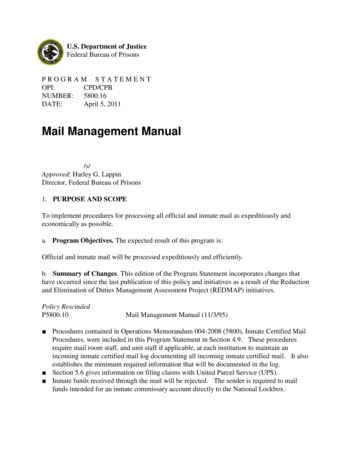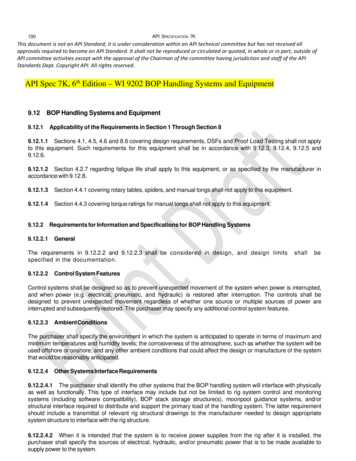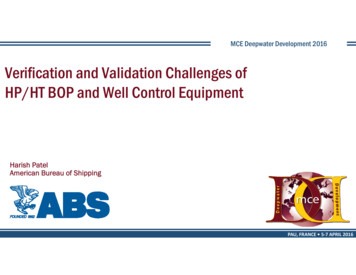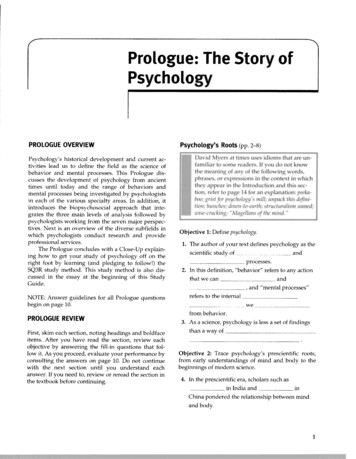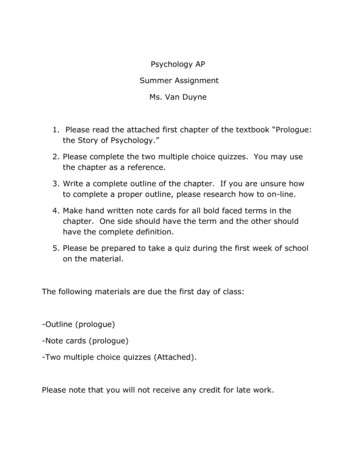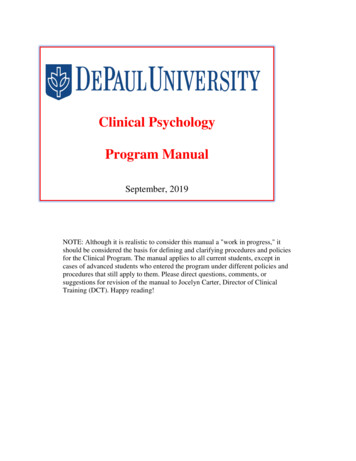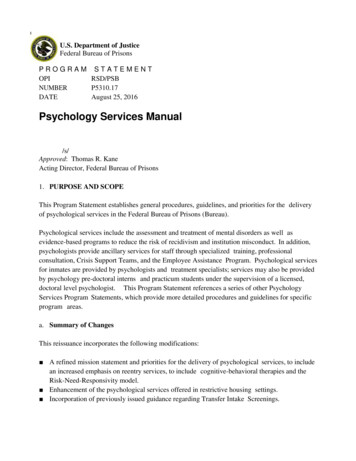
Transcription
U.S. Department of JusticeFederal Bureau of PrisonsPROGRAM STATEMENTOPIRSD/PSBNUMBERP5310.17DATEAugust 25, 2016Psychology Services Manual/s/Approved: Thomas R. KaneActing Director, Federal Bureau of Prisons1. PURPOSE AND SCOPEThis Program Statement establishes general procedures, guidelines, and priorities for the deliveryof psychological services in the Federal Bureau of Prisons (Bureau).Psychological services include the assessment and treatment of mental disorders as well asevidence-based programs to reduce the risk of recidivism and institution misconduct. In addition,psychologists provide ancillary services for staff through specialized training, professionalconsultation, Crisis Support Teams, and the Employee Assistance Program. Psychological servicesfor inmates are provided by psychologists and treatment specialists; services may also be providedby psychology pre-doctoral interns and practicum students under the supervision of a licensed,doctoral level psychologist. This Program Statement references a series of other PsychologyServices Program Statements, which provide more detailed procedures and guidelines for specificprogram areas.a. Summary of ChangesThis reissuance incorporates the following modifications: A refined mission statement and priorities for the delivery of psychological services, to includean increased emphasis on reentry services, to include cognitive-behavioral therapies and theRisk-Need-Responsivity model. Enhancement of the psychological services offered in restrictive housing settings. Incorporation of previously issued guidance regarding Transfer Intake Screenings.
Updated guidance regarding the creation and maintenance of professional clinicaldocumentation. Incorporation of strategies to assess and support the core clinical skills of correctionalpsychologists. Incorporation of guidance regarding the operation of graduate student practicum programs inPsychology Services. Removal of duplicative content addressed in other Psychology Services Program Statements.Policy RescindedP5310.12Psychology Services Manual (03/07/95)b. Program Objectives. The expected results of this Program Statement are to establish: The mission, service delivery model, and priorities for Psychology Services.Procedures for administration and management of Psychology Services Departments.Routine and specialized clinical services for inmates.Professional documentation standards to facilitate continuity of care.Workforce development strategies for Psychology Services.Psychology Services’ role in providing ancillary services for staff.c. Definition of Terms. Clinician. A provider of psychological services (e.g., psychologist, social worker, treatmentspecialist, psychology intern). External Core Clinical Skills Review. A review of core clinical skills conducted outside ofthe purview of the employee’s Warden. Evidence-Based Program (EBP). An EBP is an empirically supported intervention proven todeliver positive outcomes. Initial Intake Evaluation. The Initial Intake Evaluation is conducted with newly committedinmates to identify mental health and programming needs. Psychology Data System (PDS). The PDS is the Bureau’s official documentation system forpsychological services. This system is a module within the Bureau Electronic Medical Record(BEMR). Senior, Licensed Psychologist. For the purposes of training practicum students and interns, asenior licensed psychologist has obtained licensure to practice as a psychologist; completedtheir probationary year of employment; and completed Psychologist Familiarization Training. Transfer Intake Screening. A Transfer Intake Screening is conducted with transferred inmatesor inmates who have been out of the institution for more than 30 calendar days; e.g., inmatesP5310.178/25/20162
hospitalized in the community for an extended period of time, inmates returning from Federalor state writs, inmates returning from RRC placement. Turning Point for Restrictive Housing. The term “Turning Point” has been adopted by theBureau to refer to pre-treatment interventions designed to move inmates through theStages of Change, specifically from the early stages of pre-contemplation andcontemplation to the stage of preparation. For information about other Turning Pointprotocols (e.g., Turning Point for SOMP), contact the Psychology Services Branch.d. Institution Supplement. None required. Should local facilities make any changes outside therequired changes in the national policy or establish any local procedures to implement the nationalpolicy, the local Union may invoke to negotiate procedures or appropriate arrangements.2. STRUCTURE OF PSYCHOLOGY SERVICESa. Mission Statement. Psychology Services Departments actively support the Bureau’s missionby contributing to the operation of safe, humane, cost-effective, and appropriately secure facilitiesand by providing reentry programming to reduce recidivism and facilitate offenders’ successfulreturn to the community. Specifically, the mission of Psychology Services is to provide three keyservices in the Bureau: Mental Health Care. Psychology Services Departments provide mental health care forinmates, which include the assessment and treatment of a wide range of mental disorders. Themental health care provided to the inmates is consistent with professional standards and bestpractices in correctional psychology. Reentry Services. Psychology Services Departments offer evidence-based, cognitivebehavioral programming to address risk factors associated with criminal conduct; i.e.,criminogenic needs. This programming facilitates successful reentry by reducing an offender’slikelihood of recidivism. Behavioral Scientist Expertise. Behavioral science is the systematic analysis andinvestigation of human behavior; psychologists are trained behavioral scientists. By sharingtheir understanding of human behavior, psychologists play a significant role in the orderlyoperation of Bureau facilities. Psychologists share their expertise during formal training eventsand informal, routine consultations with staff.b. Model of Service Delivery. The Psychology Services Department is organized as a separate,centralized department within the institution or complex with adequate privacy, space, andresources to meet the institution’s need for psychological services as described above. The officesof residential Psychology Treatment Program (PTP) staff should be located within the respectiveunit. In addition, grouping of staff offices is appropriate when such grouping is done in accordancewith the special Psychology Services missions of an institution.P5310.178/25/20163
The Bureau has chosen cognitive-behavioral therapy (CBT) as a theoretical model to guidepsychological service delivery because of its proven effectiveness with inmate populations. CBTis a broad term and includes a variety of cognitive-behaviorally based treatment protocols utilizedin the Bureau, to include Rational Emotive Behavior Therapy (REBT) and Dialectical BehaviorTherapy (DBT). Empirical support for CBT’s effectiveness is noted both in the treatment ofmental disorders and criminal thinking patterns. Therefore, CBT is utilized to address twocomponents of the Psychology Services mission – mental health care and reentry services. CBTemphasizes the learning and practice of skills associated with improved mental health andadaptive, pro-social behavior. Therefore, inmates who participate in CBT and related interventionsare better able to achieve goals the Bureau has for all inmates, including responsibility, selfawareness, and independence.Specific to reentry services, the Bureau has also organized services under a Risk-Need-Responsivitymodel. Here, treatment resources are directed toward inmates who are at the highest risk of reoffense based on validated assessment procedures. Treatment protocols are selected or designedto address risk factors for criminal reoffending.These include but are not limited to those identified with substance use disorders; sex offenders;and those with offense supportive attitudes and beliefs; i.e., criminal thinking patterns.Interventions are delivered in a manner that is responsive to each inmate’s unique treatment needs,to include learning style and level of motivation.The Bureau’s core value of correctional excellence underlies the service delivery model forbehavioral scientist expertise. Psychology Services staff are “correctional workers first” and inthis context they are uniquely situated to offer their perspective on understanding human behavior.As fellow correctional workers, psychologists work alongside their Bureau peers, offering theirexpertise through both formal training events and informal staff consultation. The presence ofPsychology Services in the institution also increases the likelihood Bureau staff will feelcomfortable utilizing Employee Assistance Program and/or Crisis Support Team services.c. Priorities for Delivery of Psychological Services. The following list of priorities describesthe professional duties and responsibilities of a Psychology Services Department. The ChiefPsychologist is responsible for ensuring the department adheres to the priorities and for ensuring afair and equitable distribution of the workload associated with meeting these priorities. The ChiefPsychologist shares the priority list with new departmental staff during their initial orientation andwith all departmental staff on at least an annual basis. In addition, Chief Psychologists areresponsible for informing and educating others of the importance of performing priority tasks, asopposed to non-emergency and non-clinical tasks.P5310.178/25/20164
(1) Priority 1 – Priority 1 tasks are Psychology Services functions essential to the safety andsecurity of staff and inmates. Inmate Suicide Prevention Program, to include risk assessment, intervention, and staff training. Activities geared toward staff health, wellness, and safety to include EAP, involvement inCST/CNT, suicide prevention, and related training. Acute crisis intervention with suicidal, dangerous, psychotic, or sexually victimized inmates, toinclude consultation with staff regarding the management of these inmates. Treatment and care of inmates diagnosed with a serious mental illness, to include the deliveryof priority practices for this population. Initial psychological screening and evaluation of inmates, to include assessments of risk forsexual victimization or abusiveness. Restrictive housing rounds, reviews, and interventions. Compliance with professional, correctional, and other standards applicable to safety andsecurity.(2) Priority 2 – Priority 2 tasks are vital Psychology Services functions. Evidence-based individual and group treatment for inmate mental health issues that do not riseto the level of a serious mental disorder. Evidence-based programming aimed at reducing inmate misconduct and recidivism. Specialized Psychology Treatment Programs, e.g., Residential Drug Abuse Program, SexOffender Treatment Program, Resolve Program, Mental Health Step Down Unit. Court-ordered forensic evaluations, other policy mandated psychological evaluations, andintellectual assessments completed in conjunction with potential referrals for a GEDaccommodation. Documentation in the Psychology Data System (PDS) in the Bureau Electronic Medical Record(BEMR), in support of continuity of care within, between, and outside of Bureau facilities. Consultation with Unit Disciplinary Committee (UDC) and Discipline Hearing Officer (DHO). Mandatory clinical training for psychologists and treatment specialists. Clinical supervision of psychologists and treatment specialists. Attendance at essential administrative meetings; e.g., Special Housing Unit (SHU) DepartmentHead meeting. Recruitment and retention of psychologists, treatment specialists, and other PsychologyServices staff. Performance of functions supporting and maintaining systems of control to ensure policycompliance, to include conducting Psychology Services Operational Reviews and PerpetualAudits.P5310.178/25/20165
(3) Priority 3 – Priority 3 tasks enhance and strengthen the functioning of PsychologyServices Departments and the institution. Continuing education for Psychology Services staff in support of professional development,licensure, and/or certification. Training of graduate students, psychology interns, and post-doctoral residents. Unit team consultation regarding reentry and release planning. Consultation on general behavioral science topics. Participation in the Operational Reviews, Perpetual Audits, and/or Program Reviews of otherdepartments/facilities. Coordination of special projects and/or activities within the institution; e.g., AmericanCorrectional Association Audit, Combined Federal Campaign. Development of novel local programs, groups, or services. Participation in research projects at the local, regional, or national level. Resource staff member or subject matter expert for the Psychology Services Branch. Cross development courses and other non-mandated training unrelated to the maintenance ofprofessional licensure/certification. Collateral duties unrelated to Psychology Services.d. Duties of Psychology Services Staff in Emergency Situations. Except in emergencysituations, positions allocated and funded to provide psychological services are assigned for theprovision of these services. Emergency situations are defined as situations requiring an immediateresponse (e.g., body alarm) or activation of the institution’s emergency plans (e.g., escape, foodstrike). Except in emergency situations, psychologists and treatment specialists are not assignednon-Psychology Services duties; e.g., coverage of a custody post, unit management functions,acting department head (outside of Psychology Services), institution duty officer. This exclusionis reiterated in the Program Statements Psychology Treatment Programs and Sex OffenderPrograms.Bureau psychologists do not conduct investigations or perform fitness for duty evaluations.3. ADMINISTRATION AND MANAGEMENTPsychology Services Departments are responsible for utilizing their expertise as behavioralscientists to provide informed clinical decisions and professional recommendations. Clinicaldecisions are the sole province of the responsible clinician and/or supervisory psychologist(s), andare not to be countermanded by non-clinicians. To deliver services efficiently and effectively, thePsychology Services Department will be:P5310.178/25/20166
Staffed to meet the vital functions, congressional and Department of Justice mandates,accreditation standards, and ethical guidelines affecting the department. Staffed according to the mission and security of the facility and the specific treatment andreentry needs of the inmate population. Staffed with qualified, licensed or license eligible, doctoral level psychologists. Staffed with treatment specialists who are qualified in their specific area of treatment; e.g.,mental health treatment, sex offender treatment. Organized as a separate department, ordinarily centralized according to the treatment needs,mission, and structure of the facility. Provided with space and resources to provide psychological treatment and programs. Only assigned duties consistent with their clinical training, applicable ethical standards, andmental health role in the correctional facility (i.e., similar to physicians, attorneys andchaplains) during non-emergency situations (i.e., situations not requiring an immediateresponse or activation of the institution’s emergency plans). This stipulation does not apply toadministrative support staff in the department. Expected to respond and assume duties wherever needed and assigned during emergencysituations. As soon as possible during an institution emergency, Psychology Services staffshould be used consistent with their clinical role and training; e.g., monitoring and interventionwith the seriously mentally ill, assisting with the clinical care of inmates in restrictive housing,assessment and intervention with staff concerning the unique stressors in a crisis situation (i.e.,CST, EAP). During emergency situations, psychologists should be active in the institution –observing inmates, consulting with staff, and intervening to achieve optimal inmatemanagement.a. Organizational Structure(1) Central Office Psychology Services Branch. The Psychology Services Branch (Branch) is acomponent of the Reentry Services Division in Central Office. The Branch consists of thefollowing sections: Drug Treatment Programs; Sex Offender Programs; Mental Health Programs;Evaluations; Community Treatment Services; Clinical Education and Workforce Development;and Psychology Information Systems. The Branch is responsible for directing and supportingPsychology Services in the Bureau by: Developing, interpreting, and administering Psychology Services policies and proceduresconsistent with sound correctional management principles, evidence-based psychologicalpractices, and successful inmate reentry strategies. Providing administrative support for Psychology Services Departments by submitting annualbudget requests; preparing Psychology Services staffing requests; offering national trainingevents and continuing professional education opportunities; and providing general technicalassistance and support.P5310.178/25/20167
Advancing Psychology Services in the Bureau through the development and implementation ofStrategic Plans, pilot projects, field trials, and proposals and reports for Executive Staff. Contributing to quality assurance in Psychology Services by collaborating with the ProgramReview Division to develop Program Review Guidelines; conducting remote and on-sitequality assurance reviews of key programming areas; completing psychological reconstructionsfollowing an inmate suicide; and conducting peer reviews of Chief Psychologists. Serving as a consultant for the Regions on Psychology Services matters, to include, but notlimited to recruitment, selection, and retention of psychologists and treatment specialists, policyinterpretation, program evaluation, and Administrative Remedies.In addition, the Branch is responsible for the provision of community-based treatment services forinmates transitioning through Residential Reentry Centers (RRCs) and Home Confinement.Community Treatment Services (CTS) includes assessment and treatment of inmates withsubstance use disorders, mental illnesses and/or a history of sexual offending. CTS is described inthe Program Statement Community Transitional Drug Abuse Treatment.(2) Chief Psychologist/Deputy Chief Psychologist. Every institution must have a licensed ChiefPsychologist, who administers and monitors the implementation of psychology-related operations.The Chief Psychologist oversees clinical and administrative services for the department;communicates with the Branch regarding the needs of the department; ensures the appropriate useof Psychology Services funds and resources; provides administrative supervision for directsubordinates; and ensures the provision of clinical supervision for all clinicians in the department,to include ensuring non-licensed psychologists receive supervision as required by the statelicensing board to obtain licensure.Chief Psychologists also provide direct clinical services for inmates and share their psychologicalexpertise through training and consultation. Chief Psychologists may serve as the institution’sEmployee Assistance Program Coordinator, Suicide Prevention Coordinator, and/or Mental HealthTreatment Coordinator. The size of the Psychology Services department and the complexity of theinstitution’s mission determines the proportion of the Chief Psychologist’s time spent onadministrative functions versus direct clinical services.Most correctional complexes also have a Deputy Chief Psychologist(s), who assumesresponsibility for a portion of the fun
licensure, and/or certification. Training of graduate students, psychology interns, and post-doctoral residents. Unit team consultation regarding reentry and release planning. Consultation on general behavioral science topics. Participation in the Operational Reviews, Perpetual Audits, and/or Program Reviews of other
